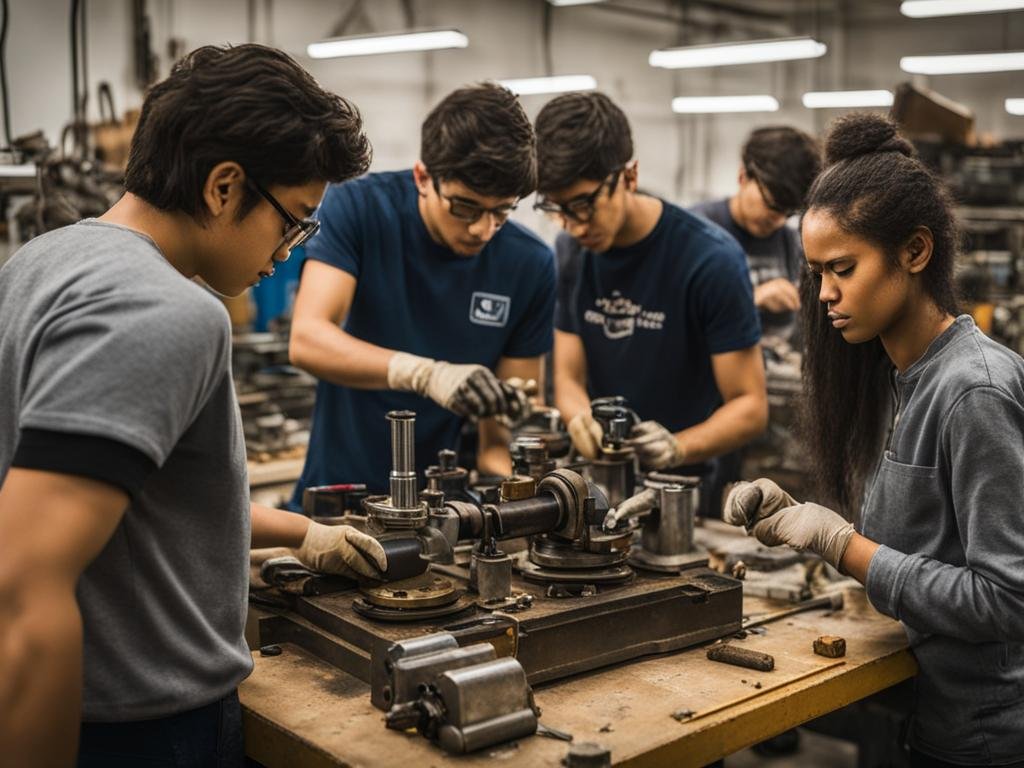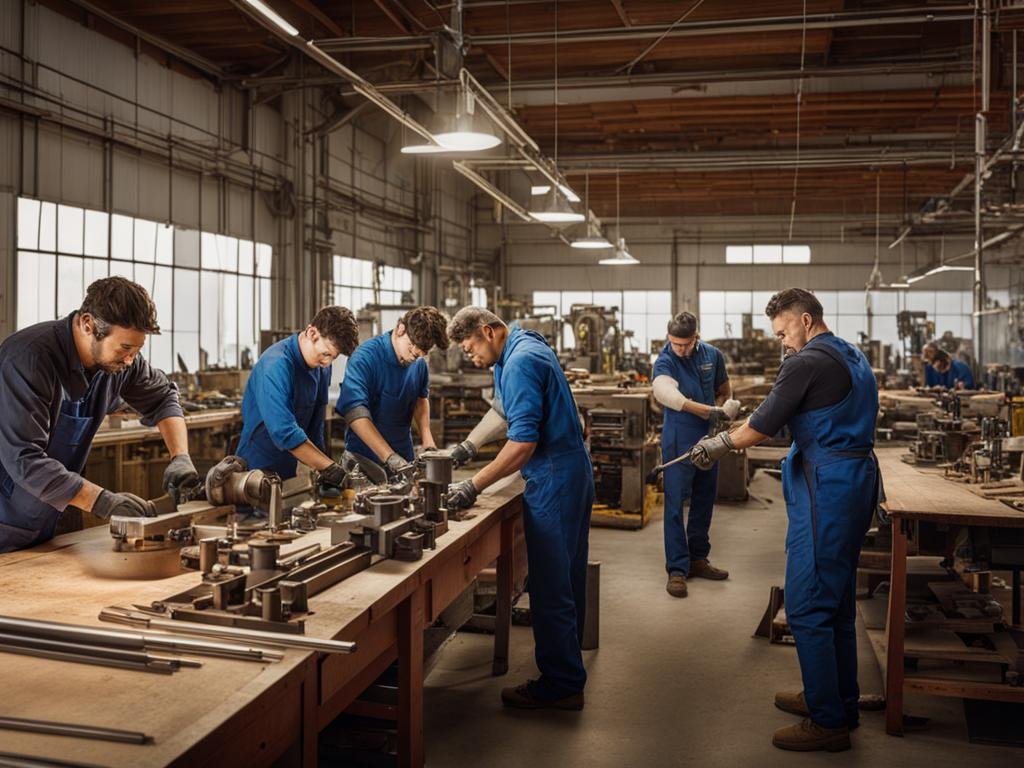Are you ready to take your career as a technical engineer to new heights? Unlocking your potential is the key to becoming a successful professional in this field. With the right skills, knowledge, and determination, you can excel in your career and achieve remarkable success. In this article, we will explore the steps you can take to unlock your potential as a technical engineer and pave the path for a fulfilling and rewarding future.
Key Takeaways:
- Unlocking your potential is essential for becoming a successful technical engineer.
- Gaining in-depth insight, skills, and knowledge is crucial for career excellence.
- Proactivity is key to enhancing performance and career growth in technical engineering.
- Building a strong network of industry professionals can open up valuable opportunities.
- Hands-on engineering workshops provide practical knowledge and problem-solving skills.
Importance of Proactivity in Technical Engineering
Being a successful technical engineer goes beyond having the right skills and knowledge. It requires proactivity – the ability to take initiative, challenge the status quo, and drive performance improvement. By embracing a proactive approach, engineers can unlock their full potential, propel their career growth, and make a significant impact in the field of technical engineering.
Proactivity in technical engineering means staying ahead of the curve, anticipating problems, and taking action to prevent them. It involves pushing boundaries, asking critical questions, and constantly seeking ways to improve processes, systems, and solutions. By actively engaging in their work and continuously looking for opportunities to innovate, technical engineers can elevate their performance and deliver outstanding results.
One key aspect of proactivity is the willingness to challenge existing methodologies and explore alternative solutions. By thinking outside the box and encouraging a culture of creative problem-solving, engineers can overcome challenges, optimize operations, and drive efficiency. Proactive engineers have the ability to identify opportunities for improvement and implement solutions that yield tangible benefits for their organizations.
Benefits of Proactivity in Technical Engineering
- Enhanced career growth: Proactive technical engineers are recognized for their initiative and drive. They are more likely to be considered for promotions, leadership roles, and challenging projects that contribute to their professional development.
- Improved performance: By taking ownership of their work and actively seeking ways to improve, proactive engineers consistently deliver high-quality results. They exceed expectations, meet deadlines, and maintain a reputation for excellence.
- Innovation and problem-solving: Proactive engineers have the mindset to identify opportunities for innovation and find creative solutions to complex problems. They contribute to the advancement of the field and drive meaningful change.
- Collaboration and teamwork: Proactivity fosters collaboration, as engineers actively engage with colleagues, share ideas, and work together to achieve common goals. This creates a positive and productive work environment.
Overall, proactivity is a cornerstone of success in the field of technical engineering. By taking the initiative, challenging the status quo, and constantly improving, engineers can unlock their potential, drive career growth, and make a lasting impact in the industry.
Building a Strong Network in the Tech Industry
As a technical engineer, building a strong network of industry professionals is vital for career advancement and unlocking your full potential. Networking not only opens up opportunities but also provides access to valuable resources that can help you stay updated with industry trends and make meaningful connections.
When it comes to networking, it’s important to be proactive and engage with professionals in your field. Attend industry events, join relevant online communities and forums, and participate in technical conferences. These platforms offer a great opportunity to connect with industry leaders, exchange knowledge, and build relationships that can lead to new career opportunities.
Additionally, consider seeking out mentorship from experienced professionals in your field. A mentor can provide valuable guidance, offer insights into navigating the industry, and help you develop important skills. By having someone to turn to for advice and support, you’ll gain a deeper understanding of your career path and open doors to new possibilities.
| Benefits of Building a Strong Network: |
|---|
| – Access to job opportunities |
| – Collaboration on projects |
| – Learning from industry experts |
| – Building a personal brand |
| – Staying updated with industry trends |
| – Access to valuable resources |
Remember, networking is not just about what others can do for you, but also what you can offer in return. Be willing to share your knowledge and expertise with others, engage in meaningful conversations, and build mutually beneficial relationships based on trust and respect. By actively participating in the tech community, you’ll be able to unlock your potential as a technical engineer and create a solid foundation for your career.
The Power of Hands-on Engineering Workshops
Hands-on engineering workshops offer technical engineers a unique opportunity to enhance their skills and knowledge through practical learning experiences. These workshops provide a platform for engineers to dive deep into technical topics, gain practical knowledge, and enhance their problem-solving skills. By participating in hands-on workshops, engineers can unlock their full potential and stay ahead in their careers.
One of the key advantages of hands-on workshops is the opportunity to gain practical knowledge. Traditional education often focuses on theoretical concepts, but workshops provide a hands-on approach where engineers can apply their knowledge to real-world scenarios. This practical experience enhances their understanding and prepares them for the challenges they may face in their careers.
In addition to practical knowledge, hands-on workshops also help engineers develop their problem-solving skills. By working on real-world engineering problems, engineers are exposed to different challenges that require critical thinking and innovative solutions. These workshops encourage engineers to think outside the box and develop their problem-solving abilities, which are essential for success in the field.
Furthermore, hands-on workshops provide a collaborative learning environment where engineers can network and learn from their peers. Engaging with professionals from different backgrounds and industries allows engineers to broaden their perspectives and learn new approaches to problem-solving. The exchange of ideas and experiences in these workshops fosters creativity and innovation, further enhancing the engineer’s potential.
Hands-on Workshop Benefits:
- Gain practical knowledge and skills
- Enhance problem-solving abilities
- Collaborate and network with industry professionals
- Foster creativity and innovation
Hands-on engineering workshops are a valuable investment for technical engineers looking to unlock their potential. By actively participating in practical learning experiences, engineers can develop their skills, broaden their knowledge, and stay ahead in the ever-evolving field of engineering.
| Workshop | Description | Duration |
|---|---|---|
| Advanced Robotics | Explore advanced robotics technologies and applications. | 3 days |
| Industrial Automation | Learn about automation systems for industrial processes. | 2 days |
| Software Development | Develop software solutions for engineering projects. | 4 days |
These are just a few examples of the hands-on engineering workshops available. Engineers should research and choose workshops that align with their interests and career goals to maximize the benefits they can gain.

Embracing Change in the Tech Industry
The tech industry is a rapidly evolving landscape, and the ability to embrace change is crucial for the success of a technical engineer. With advancements in technology, new methodologies, and emerging trends, staying adaptable and open to change is essential for navigating through the ever-changing industry. By embracing change, technical engineers can unlock their full potential and pave the way for career growth and success.
Change management is a fundamental skill that technical engineers should possess. It involves the ability to effectively plan, implement, and adapt to changes in technology, processes, or organizational structures. By embracing change and managing it effectively, engineers can optimize performance, streamline workflows, and stay ahead of the curve. This adaptability not only enhances their individual skills but also contributes to the growth and development of the entire organization.
“The only constant in life and in the tech industry is change. Embracing it allows us to stay relevant, innovate, and grow, both personally and professionally.”
To embrace change in the tech industry, technical engineers can take several proactive steps. First, staying updated with emerging technologies and industry trends is crucial. Continuous learning and keeping abreast of the latest developments allow engineers to adapt quickly and effectively. Attending industry events, conferences, and webinars can provide valuable insights into emerging technologies and help engineers understand the direction the industry is heading.
Networking with like-minded professionals and industry leaders is another way to embrace change. Engaging in discussions, sharing ideas, and seeking different perspectives can broaden horizons and foster a proactive mindset. Building a strong network also provides opportunities for collaboration, knowledge sharing, and access to mentors who can guide engineers through the changing landscape of the tech industry.

| Benefits of Embracing Change in the Tech Industry |
|---|
| 1. Career Growth: Embracing change opens up new opportunities for career advancement and professional growth. |
| 2. Increased Resilience: Adapting to change builds resilience and the ability to navigate through challenges. |
| 3. Innovation and Creativity: Embracing change fosters innovation and encourages creative problem-solving. |
| 4. Competitive Edge: By staying updated with emerging technologies, technical engineers gain a competitive edge in the job market. |
| 5. Professional Agility: Embracing change enhances professional agility and the ability to quickly adapt to new technologies and methodologies. |
In conclusion, embracing change is a pivotal factor in unlocking the potential of a technical engineer. By staying adaptable, continuously learning, networking, and actively managing change, engineers can thrive in the dynamic tech industry. Embracing change not only leads to personal and professional growth but also allows engineers to make a lasting impact and contribute to the advancement of the industry as a whole.
Mentorship and Coaching for Technical Engineers
Mentorship and coaching play a crucial role in the growth and development of technical engineers. By seeking guidance from experienced professionals in the industry, engineers can gain valuable insights, support, and guidance to unlock their full potential in their careers.
One of the key benefits of mentorship is the opportunity to learn from someone who has already traversed the path to success. A mentor can provide advice, share personal experiences, and offer valuable industry knowledge that can accelerate a technical engineer’s growth. They can guide engineers in navigating challenges, making informed decisions, and developing essential skills required for career advancement.
Coaching, on the other hand, focuses on unleashing an engineer’s innate abilities and leveraging their strengths. A coach can provide constructive feedback, assist in goal setting, and help engineers identify areas for improvement. Through personalized guidance and targeted development plans, coaching can empower technical engineers to enhance their performance, overcome obstacles, and achieve their career aspirations.
The Impact of Mentorship and Coaching
Mentorship and coaching have a profound impact on the career development of technical engineers. According to a study, engineers who had mentors were more likely to be satisfied with their careers and experience higher levels of career success than those without mentors. Additionally, coaching has been shown to increase self-confidence, improve problem-solving skills, and enable engineers to adapt to changing industry demands.
“Having a mentor has been invaluable in my career. They have provided guidance, challenged me to step out of my comfort zone, and introduced me to new opportunities. I credit much of my success to their support and guidance.” – Jane Doe, Senior Technical Engineer
By fostering a supportive mentorship and coaching culture within the technical engineering community, professionals can create a nurturing environment where engineers can thrive. This collaboration not only benefits the individual engineers but also contributes to the overall growth and innovation in the industry.

The Value of Practical Engineering Workshops
Practical engineering workshops offer technical engineers a unique opportunity to enhance their skills, acquire practical knowledge, and advance their careers. These workshops provide hands-on training, real-world scenarios, and insights from industry experts, making them invaluable for professional growth. Attending practical engineering workshops can unlock your potential as a technical engineer and open doors to new opportunities.
One of the key benefits of practical workshops is the opportunity to gain practical skills that can be immediately applied in your work. Through hands-on exercises and real-life case studies, you can develop a deeper understanding of complex technical concepts and enhance your problem-solving abilities. This practical knowledge not only improves your performance on the job but also sets you apart from your peers and makes you a valuable asset to any organization.
Furthermore, practical workshops provide networking opportunities with industry professionals and like-minded individuals. Engaging with experts and peers in your field allows you to exchange ideas, learn from their experiences, and build valuable connections. This networking can open doors to career advancement, collaborations, and even potential job opportunities. By expanding your professional network through practical workshops, you can create a strong support system and stay updated on the latest industry trends and insights.
Table: Benefits of Attending Practical Engineering Workshops
| Benefits | Description |
|---|---|
| Enhanced Technical Skills | Gain practical knowledge and hands-on experience in specific technical areas. |
| Improved Problem-Solving Abilities | Develop effective strategies to identify and solve complex technical challenges. |
| Networking Opportunities | Connect with industry professionals, expand your network, and learn from experts. |
| Career Advancement | Open doors to new opportunities, promotions, and higher-level positions. |
Attending practical engineering workshops is a strategic investment in your professional development. Not only do these workshops provide valuable technical skills and knowledge, but they also offer networking opportunities that can significantly impact your career growth. By taking advantage of these workshops, you can unlock your full potential as a technical engineer and position yourself for success in the ever-evolving tech industry.

Unlocking Technical Potential Through Continuous Learning
Continuous learning is a vital component for technical engineers to unlock their full potential in the constantly evolving tech industry. Staying up-to-date with industry trends and continuously developing new skills is essential for career growth and success. By engaging in lifelong learning, technical engineers can position themselves as valuable assets and embrace new opportunities.
“The future belongs to those who learn more skills and combine them in creative ways.” – Robert Greene
Importance of Continuous Learning
Continuous learning allows technical engineers to stay adaptable in an ever-changing industry. By keeping up with emerging technologies, industry best practices, and advancements, engineers can remain relevant in their field and maintain a competitive edge. Continuous learning also promotes personal growth and enables engineers to take on new challenges and responsibilities. It fosters a growth mindset and opens doors to exciting career opportunities.
Staying Updated with Industry Trends
One of the key aspects of continuous learning is staying updated with the latest industry trends. This involves regularly reading industry publications, attending conferences and webinars, and participating in professional development programs. By staying informed, technical engineers can identify emerging trends, anticipate market demands, and proactively adapt their skills to meet industry needs.
Developing New Skills
In addition to staying updated with industry trends, continuous learning also involves actively developing new skills. This can be done through online courses, workshops, certifications, or on-the-job training. Technical engineers should focus on acquiring skills that are in demand and align with their career goals. By continuously expanding their skillset, engineers can become versatile professionals who can tackle a wide range of challenges and contribute to the success of their organizations.
| Benefits of Continuous Learning for Technical Engineers | How to Achieve Continuous Learning |
|---|---|
|
|
Continuous learning is a lifelong journey that requires dedication and a commitment to personal growth. By embracing continuous learning, technical engineers can unlock their full potential, stay ahead of industry trends, and make significant contributions to the ever-evolving tech industry.

Also Read : Unlock Your Future With A Technical Architect Career
Conclusion
Congratulations on taking the necessary steps to unlock your potential as a technical engineer. By embracing proactivity, building a strong network, participating in hands-on workshops, embracing change, seeking mentorship, and committing to continuous learning, you are on your way to achieving career growth and success in the tech industry.
As a technical engineer, it is essential that you take the initiative to stay ahead of the curve. Be proactive in identifying opportunities for improvement, asking questions, and challenging the status quo. This mindset will not only enhance your performance but also contribute to your overall growth and development.
Networking is a crucial aspect of building a successful career in the tech industry. Connect with industry professionals, attend networking events, and leverage online platforms to expand your network. Building strong relationships will open doors to new opportunities, provide valuable insights, and support your career advancement.
Hands-on workshops offer a unique opportunity to gain practical knowledge and enhance your problem-solving skills. By actively participating in these workshops, you can apply theoretical concepts to real-world scenarios, deepen your understanding, and acquire valuable skills that will set you apart as a technical engineer.
Embracing change is key to staying relevant in the fast-paced tech industry. Stay updated with emerging technologies, attend industry conferences and seminars, and adapt to new trends. Being adaptable and agile will allow you to navigate the ever-evolving landscape and seize new opportunities for growth.
Mentorship and coaching play a significant role in the professional development of a technical engineer. Seek guidance from experienced professionals who can provide insights, support, and guidance as you navigate your career. Their expertise and advice will accelerate your growth and help you unlock your full potential.
Lastly, commit to continuous learning and skill development. Stay informed about the latest industry trends, acquire new skills, and engage in lifelong learning. By staying curious and dedicated to ongoing education, you can stay ahead of the curve and ensure long-term success as a technical engineer.
Remember, unlocking your potential as a technical engineer is an ongoing journey. Stay motivated, remain proactive, and embrace new opportunities that will help you reach new heights in your career. With dedication and a growth mindset, you are well on your way to achieving career growth and success in the tech industry.
FAQ
Q: What is the role of a technical engineer?
A: Technical engineers are responsible for finding the right technical solutions to meet a client’s needs. They often work with a team to design, develop, and maintain hardware and software products and processes.
Q: What qualifications are required to become a technical engineer?
A: To become a technical engineer, you’ll need a degree in a related discipline such as mechanical engineering, computer science, or a similar field. Additionally, having knowledge of operating systems and the ability to perform troubleshooting is essential.
Q: What are the responsibilities of a technical engineer?
A: The responsibilities of a technical engineer include resolving hardware and software issues, providing desk-side support to employees, and ensuring the efficient operation of the IT infrastructure. They may also be tasked with maintaining and troubleshooting various equipment and software.
Q: How is the career progression for a technical engineer?
A: The career progression for a technical engineer can vary depending on the company and the individual’s performance. It is common for technical engineers to advance to managerial or project leadership roles as they gain experience and expertise in the field.
Q: What is the average salary for a technical engineer?
A: The total compensation for technical engineers can depend on factors such as experience, the company they work for, and the specific job responsibilities. However, technical engineers often earn competitive salaries and may receive financial assistance for additional certifications or training.
Q: How can one join the field of technical engineering?
A: To join the field of technical engineering, you’ll need to pursue a degree in a relevant discipline and acquire the necessary skills and knowledge related to hardware and software. Additionally, gaining practical experience through internships or hands-on projects can greatly enhance your prospects for employment in this field.
Q: What resources are available for technical engineers?
A: Technical engineers can access various resources such as industry publications, online forums, and professional networks to stay updated on the latest advancements in technology and best practices. They may also seek assistance from industry associations and educational institutions for further skill development.
Q: Are there any tips for excelling in a technical engineering career?
A: To excel in a technical engineering career, it is important to stay current with industry trends, continuously improve your technical skills, and develop strong problem-solving abilities. Additionally, effective communication and teamwork are essential for success in this field.
Q: What kind of equipment do technical engineers work with?
A: Technical engineers often work with a range of hardware and software, including but not limited to desktop computers, networking equipment, servers, and specialized tools for troubleshooting and maintenance. Their work may also involve the testing and evaluation of new technologies and equipment.
Q: What are the typical tasks performed by technical engineers?
A: Technical engineers may be involved in tasks such as optimizing system performance, diagnosing and resolving technical issues, ensuring data security, and providing user support. They may also play a key role in the implementation and maintenance of digital infrastructure within an organization.
Source Links
https://utilitiesone.com/enhancing-technical-skills-through-practical-engineering-workshops

